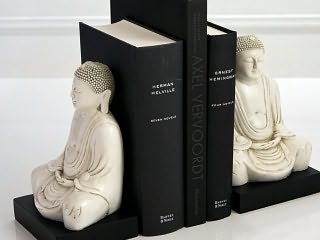As you begin 2011, anxious as well as excited about the future of books, I'll offer just a bit of advice for the new year: Consider infinity and relax.
We don't read enough (according to our own unforgiving standards) and we never will. If you decided, starting tomorrow, to read a book every day for the next 10 years, you would consume 3,650 books (leap years, I know, but I'm rounding off). You probably wouldn't have time to do anything else, however, so by 2021 you'd have lost your job, your home, your family, etc. Even your library and bookstore might get sick of you after a while.
Each year, tens of thousands of print books and book-like substances are released upon a dazed and overwhelmed reading public. The digital revolution will soon make even those numbers seem quaint. As I anticipate a new year of more books and more reading options, perhaps it's not surprising that I find myself taking solace in thoughts about the epic life span of a useful object found in homes and bookstores and libraries worldwide--the humble bookend.
You can't keep up, so rather than worrying incessantly about unread books and the electronic biblio-deluge, consider... infinity. For the purpose of scientific and philosophical experimentation, let's agree to represent infinity as a set of polished marble bookends. They are real, but you can think of them as a metaphor if it helps.  My bookends work well, but I'm not really testing their full capabilities since they usually hold no more than a dozen titles, all precious to me if not necessarily to anyone else.
My bookends work well, but I'm not really testing their full capabilities since they usually hold no more than a dozen titles, all precious to me if not necessarily to anyone else.
It is the potential bookends represent that matters here. These marble reading tools exist because of geological metamorphosis during the late Cambrian or early Ordovician eras, as well as more recent quarrying, cutting, carving and polishing. They are fully equipped to withstand pressure, friction and abrasion. They are easy to operate--place on a flat surface and insert books. Repeat as necessary.
Theoretically, all of the books ever printed would fit between a single set of marble bookends. Of course this infinite collection would require really great bookends. But marble can endure 17,000 pounds per square inch of pressure. How many books is that? Clearly, my imagination trumps my scientific knowledge. You can blame early exposure to Jorge Luis Borges's "The Library of Babel."
Gravity is an issue as well.
"Indeed, gravity, the force that makes bookends work, is the very definition of verticality," writes Henry Petroski in The Book on the Bookshelf. "Yet it is the equally definitive horizontal force, caused by bearing down of the bookend's weight, that creates the force which resists sliding. Contrary to the conventional wisdom, the simplest machine is not the wedge but the block.... When called upon, bookends--many of which are really nothing but sculpted blocks--develop a horizontal push to shore up books that want to fall. Friction is the secret, of course."
Words to live by for 2011.
Much attention has been given to the creation of an all-encompassing digital library. My bookends represent an alternative, if imaginary, concept--a limitless collection of books that I've read or not read or reread, with some space left over for books I'll buy in the future to read or not read. Too many books to count, all lined up neatly, stretching toward infinity, yet nestled firmly between a pair of delicately carved marble bookends.
Why bookends?
For me, they are an enduring symbol of the reading life--not altars exactly, but maybe fortress walls or temple columns in miniature. Marble bookends are older than we are. Holding up a few books is just a small favor they do to pass geologic time. Archaeologists may or may not uncover books and smashed e-readers in the future ruins of our era, but they will definitely find marble bookends.
Which brings me back to the book world of 2011.
In his book The Eyes of the Heart: A Memoir of the Lost and Found, Frederick Buechner considers his personal library and a particular title that, "like a great many other books I own, I have never read. ('Why on earth would I want to do that?' a friend of mine answered when somebody asked him once if he had read all his.)."
Why indeed? My New Year's gift to you is a virtual set of marble bookends, which hold between them all the books in the world. Read what you want to this year, when you can. The bookends will hold your place until you're ready for more. And there will be more.--Robert Gray (column archives available at Fresh Eyes Now)

